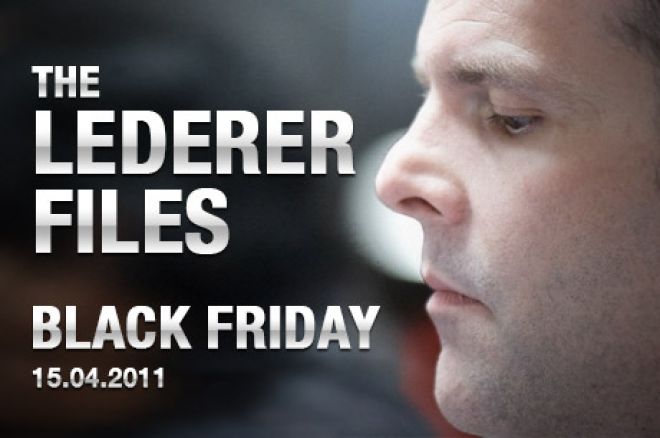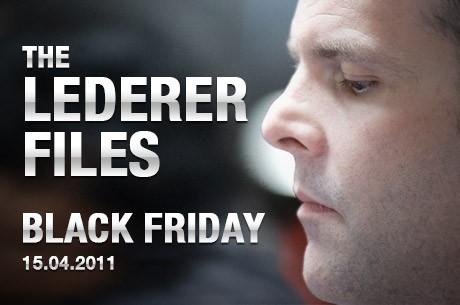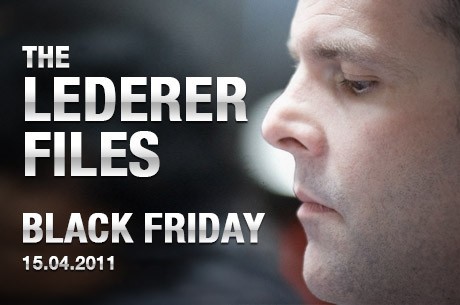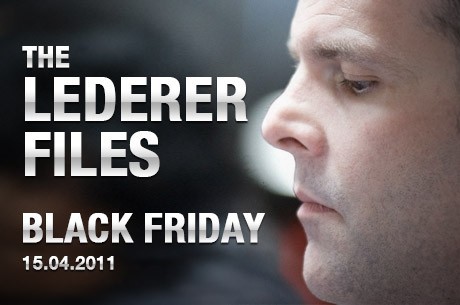Recapping The Lederer Files — Part 1

PokerNews recently sat down with Howard Lederer for a long video interview on all things Full Tilt Poker and Black Friday. For 15 months, players have waited to hear from Lederer, and recently he answered some lingering questions.
“I just think now is the time for the poker public to get some answers to questions that they deserve to have answered,” Lederer candidly told PokerNews' Matthew Parvis in an exclusive interview.
“For them to get some facts that have obviously not been shared with them over the last 15 months. There were, as we’ll discuss going forward, there were very good reasons why the company and the principles were not discussing these issues in public during the 15 months, but now that the deal has been completed, I think this is the time.”
“I would like to say one thing though, sort of before we get into the interview, and that is I am one person in what was a very complicated situation, so I don’t have all the answers, and I don’t have all the facts,” Lederer said.
“I’m going to try my best here to offer the facts that I know, that I feel comfortable offering in terms of I don’t want to be speculating about anything. So I’m going to offer some opinions, certainly I have opinions about things that happened and I’m going to be offering facts.”
To watch each segment of the released footage, follow these links:
- In Part 1 of this exclusive interview series with PokerNews, Lederer explains the reasoning for his elongated silence. He also discusses the early phases of Full Tilt Poker, including his initial impressions of CEO Ray Bitar, the company's original board of directors and investors, and more.
- In Part 2 of The Lederer Files, Lederer discusses Full Tilt Poker's decision to remain in the U.S. post-UIGEA and the payment processing issues that went along with that decision.
- Lederer discusses his initial discovery of a nine-figure backlog resulting from transaction issues with payment processors in Part 3 of this exclusive interview series. Lederer claims that CEO Ray Bitar left him and the board members in the dark about the backlog.
- In Part 4 of The Lederer Files, Lederer opens up about the first few months after Black Friday, including the devastating news he discovered on April 21, 2012.
Please note, there are parts in this recap that were not released in the seven-part video series.
The interview with Lederer began with the origin of Full Tilt Poker. He spoke about his introduction to both Chris Ferguson and Ray Bitar, who had partnered with a gentleman by the name of Brett Scharf to start an online poker venture in 2003, which became JetSet Poker.
When Lederer came on board, he joined the likes of Phil Ivey, Rafe Furst, Phil Gordon, Perry Friedman and Andy Bloch, who were all recruited by Ferguson, as strategic investors (pros with marketing value). Scharf focused more on recruiting traditional investors.
“For whatever reason, the relationship between Brett and Chris soured. I don’t think Chris trusted him at some point, and he felt that this was the time you need to deal with something like that, it’s very early in the company’s life,” Lederer explained. As such, after the World Series of Poker in 2003 a divorce was facilitated by Bitar. Terms were reached in late August that saw Ferguson, Bitar and company go there separate ways with a copy of the software and the name Full Tilt Poker.
On Sept. 4, 2004, Full Tilt Poker was officially founded with Erik Seidel and John Juanda joining the ownership. “On September 4, the company had $700,000 to $750,000, but I think we owed some legal fees obviously from the legal work that had led up to the separation. With that money the company was to try and move as far along in the development process of the software as it could get,” Lederer said.
According to Lederer, most media reports on shareholder percentages are accurate, but given that board members were not professional CEOs, lawyers and accountants, they saw their role as advisory. "Nowhere in the operating agreement did it ever hint at, suggest, or mandate that the board should ever conduct outside, independent forensic audits of any financial figures that management might have provided,” Lederer said. “That wasn’t an expectation of the board just was not our job . . . and at no time did the board ever imply or say to the members that that was something they would be doing."
For strategic investors, 5 percent of company profits set aside to recognize the fact that they brought a little something extra to the table. “I don’t believe she was ever offered shares in the company by anyone that had the authority to give her those shares,” Lederer said when asked if Clonie Gowen, who had previously filed suit against FTP, was a shareholder as she claimed. “I know that Ray Bitar mentioned to me that he never offered her shares.”
Upon the company’s formation as a California LLC, legal counsel Ian Imrich oversaw the establishment of a company operating agreement that stated any changes can be made by a simple majority vote, though a two-thirds vote was needed to remove a board member abruptly during their year-long term. In addition, a board of directors was established that included Ivey, Bitar, Ferguson, Friedman and Lederer.
“I think that’s what I was referred to,” Lederer said when asked if he was FTP’s president. “But I don’t know if I ever really officially had that title; in fact, I don’t think I was an employee of really any company at any time, but what I was was this concept of a manager in Tiltware. So Tiltware had two managers, and that was Ray and me. There were certain responsibilities that managers of the LLC had…certainly as a manager and member of the board I carried the weight of President. I guess I was referred to as president, I don’t know if I actually had that title, but I felt like that was my role—Ray was the CEO, I was the president.”
Lederer helped design the site by providing input and dealing with various problems. "We were squashing bugs, crashing on a weekly basis, and we were just having trouble handling the growth,” Lederer explained. “It was a huge amount of focus. I spent a lot of time talking with, and working with, and trying to help solve problems and get it to a place that it could handle the growth. It was fun, it was exciting."
As the company grew, it became apparent that not everyone was going to get along. In fact, there was a group of owners who didn’t like Bitar and felt he wasn’t doing a very good job. One man in that group was John Juanda. “John was a vocal owner in the anti-Ray Bitar camp for sure,” Lederer confirmed. “Certainly John was not a Ray Bitar fan…owners had one responsibility and that was to elect a board. If they didn’t like the direction of the company or who was running the company, they had a remedy.”
Another person who thought Bitar was unqualified and unprofessional was Friedman, who brought up his concerns to the board of directors and called for the removal of the CEO. "It's certainly accurate that Perry, in particular, maybe more than any other member, did not get along with Ray,” Lederer said. “Perry had left the company in terms of his role as a programmer due to his clashes with Ray, and soon thereafter he resigned from the board [in 2005]."
Despite Bitar’s critics, a vote for his removal was never called and both Ferguson and Lederer continued to support him. “I saw his dedication to the company,” Lederer said. “The company was his life. I thought that some concerns were valid, absolutely, but I thought having an owner/CEO that was that invested and cared that much about the company would overcome it, and I had a good working relationship with Ray. I would have accepted his removal for sure…but I worked with Ray everyday for years during the early years of the company. I think it would be a very poor idea actually, unless I was sure that he was going to be removed, for me to support such an action, and I didn’t.”
It was around that time, somewhere between 2005 and 2006, that the possibility of making distributions was discussed. In April of 2007, the first distributions were given to board members. "The company had about $20 to 30 million in excess cash that it didn't need, or we didn't think it needed at the time," Lederer said. “I can tell you that there’s one person amongst the membership who was always very anti-distribution, never wanted to make them in the first place, always argued very strongly against them, and always argued that every single distribution the company made would weaken the company, and that was Chris Ferguson. Obviously, in hindsight he was so right about that.”
In the summer of 2006, about a year before distributions, the company moved to Dublin, Ireland, though not because of the potential legislation, at least according to Lederer. Speaking of which, on Oct. 13, 2006, the Unlawful Internet Gaming Enforcement Act (UIGEA) was passed under then President George W. Bush.
On Sept. 4, 2008, five years to the day of FTP’s foundation, Lederer retired from the company. “I initially had agreed to work for two years, and then I believe I agreed to three more, but I'm not sure of that. But I know that, and I'm not even sure what my contract looked like, or if I even had a contract with the company, but I know that I hadn’t made a commitment beyond September 2008. We thought about the work at the company in terms of years, and at some point in the fall of 2007 I just thought it was time to move on. It was very difficult on me personally and on my marriage being away that much, being in Dublin that much, traveling that much, it was very hard. I wasn't prepared to relocate to Dublin… so I thought it was time to move on.”
Lederer claimed that the UIGEA and fear of reprisal played no role in his decision to retire, and that the initial response from the board was to find a replacement, possibly a COO. Bitar proceeded to bring in a number of senior executives, and the company began to grow; however, they never found an “O” level person. "People from below got promoted, and some new people came in. A group of people took bits of responsibilities,” Lederer said. "I think I underestimated what I brought to the table, just in the terms of behaving a strong influence on Ray."
Despite retiring from day-to-day operations, the Board of Directors did not hold a re-election and Lederer stayed on board, which desired by both members of the Board and Lederer himself. “We had four board member, our operating agreement called for five, and we basically said OK we have four people on the board we need somebody from the ownership group to step up and be a part of the board, and we got no takers,” Lederer said. “We never filled that seat, and we never held another election for the entire life of the company. Again, one of my serious regrets about my time with the company is that I didn’t make a bigger deal about that, I think that’s a big mistake. You can’t allow your owners to be just that checked out.”
“I regret very much how I left, but that’s looking in hindsight after a disaster like this,” Lederer said of his departure. "I regret a lot, and I’m very sorry that my personal failings as an executive led to, I think, some of the things that happened."
One of the things that happened included the backlog of players’ funds. In other words, in the wake of Black Friday, players made deposits that weren’t deducted from their bank accounts, and FTP credited them. Lederer was upset under the conditions that the backlog happened, though he said it is not uncommon in the business world for companies to create a backlog. With that said, the FTP backlog created by approximately 130,000 customers was complicated and took time to understand and figure out.
The backlog created a mess that was highlighted in a February report, one that Lederer claimed he never received. "Clearly things got out of hand, and people in Dublin were trying to clean up the mess…if the board had any inkling that there was this kind of hole in our balance sheet, we would have responded in the same way we tried to respond after April 15. There would have been no distributions, the whole discussion would have shifted to finding an investor.”
Speaking of April 15, 2011, also known as Black Friday, Lederer revealed that he first learned via email while sharing a dinner with Huck Seed in Dubai. Because of some logistical problems, it wasn’t until April 17 that Lederer was able to make his way to Dublin in time for the office to open on Monday, April 18.
In the interview, Lederer went on to address a supposed statement released by FTP on April 16 and clarified that the statement was originally released in either 2009 or 2010, taken out of context, picked up by DOJ, and unjustly worked into the amended complaint. That led to confirmation that the only communication to public after Black Friday was a press release that acknowledged the seizure happened and that FTP was ceasing operations in the United States.
When in Dublin, Lederer turned his attention to finding out the company’s exact financial situation in an effort complicated by the backlog. In fact, the backlog needed to be determined before the any financial answers could be ascertained. It took a few days for the backlog to be determined, and on April 21, 2011, it was learned that there was a $250 million difference between what was owed to the players ($330 to $350 million) and the cash that was on hand ($80 to $100 million).
“It’s all about trying to find a solution and knowing that the only way we’re going to solve this problem is to preserve the assets of the company, the very valuable assets of the company, and use those assets to effect some sort of transaction that’s going to inject enough cash into the company, or sell the company outright to somebody that’s going to make sure that our customers get paid,” Lederer explained about the company’s mentality at the time.
Lederer believed it was important for the board to function as a group, but on the first member call, Friedman had "lawyered up." On the next call, several other members had done the same. In addition, some of the 22 owners who didn’t participate in the day-to-day decisions of the company like Bitar did allowed themselves to feel like victims. “The membership was a problem. We were our own worst enemy,” Lederer said. “I think it’s very difficult to get people to take responsibility for the problem, and people have to take responsibility for the problem before they feel like they really need to fix the problem, or that they have an obligation to fix the problem.”
Lederer then went on to explain his own opinion: “No matter who was actually actively culpable in creating the problem, we own the company. We were responsible, and there were a number of owners, I felt like, who understood that, and [wanted to do whatever it took to get customers paid], and we has another group who were much more interested in trying to figure out who was at fault.”
Get all the latest PokerNews updates on your social media outlets. on Twitter and on Facebook today!
In this Series
- 1 The Lederer Files: An Introduction
- 2 The Lederer Files: The Beginning of Full Tilt Poker
- 3 The Lederer Files: The UIGEA, Segregated Accounts, and Retirement
- 4 The Lederer Files: The Backlog and Black Friday
- 5 The Lederer Files: Black Friday Aftermath, the Search for a Solution
- 6 The Lederer Files: The Phil Ivey Lawsuit, Transition 2.0
- 7 The Lederer Files: Outstanding Member Loans, Groupe Bernard Tapie Complications
- 8 The Lederer Files: PokerStars Saves the Day, Apology to Full Tilt Poker's Customers
- 9 The Lederer Files: The Process and Opinions
- 10 Recapping The Lederer Files — Part 1
- 11 Recapping the Lederer Files — Part 2








